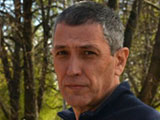Orwell’s 1984 and Totalitarianism, Pt. III: The Plot
by Israel Centeno and translated by Kelly Harrison / December 18, 2012 / No comments
A guide for perpetuating totalitarian regimes.

'It was terribly dangerous to let your thoughts wander when you were ... within range of a telescreen. The smallest thing could give you away. A nervous tic, an unconscious look of anxiety, a habit of muttering to yourself--anything that carried with it the suggestion of abnormality, of having something to hide.' --George Orwell, 1984. Photo: John Perivolaris
Below is part three in a short series of articles concerning George Orwell’s Nineteen Eighty-Four and Animal Farm, two paradigmatic novels that address the issue of a future without freedom, from subtle dictatorships to totalitarianism. Read parts one and two.
In Nineteen Eighty-Four, the world is divided into three great superstates: Oceania, Eurasia, and Eastasia. Oceania comprises the Americas, Australasia, Great Britain, and southern Africa. Eurasia was created through the expansion of the Soviet Union across Europe. Eastasia consists of China, Japan and Indo-China. In the book the world fights a never-ending war, the three powers battling one another in an ever-changing situation of alliances and hostilities. At the beginning of the novel, Oceania is at war with Eurasia, it has always been at war with Eurasia, and it is allied with Eastasia. By the end of the book, the opposite is true.

- From his lonely watch post Albert Camus asked who among us has not experienced exile yet still managed to preserve a spark of fire in their soul. “We’re all alone,” Natalia Sedova cried in exile on hearing of her husband Leon Trotsky’s affair with Frida Kahlo. In his novel Night Watch, Stephen Koch follows the incestuous love affair of David and Harriet, wealthy siblings watching the world from their solitary exile. Koch’s writing, Camus’s theories, and Trotsky’s affair all come back to exile and lead me to reflect on the human condition. From my own vantage point, my Night Watch, I will reflect on my questions of exile, writing, and the human condition.

- Israel Centeno was born in 1958 in Caracas, Venezuela, and currently lives in Pittsburgh as a Writer-in-Residence with City of Asylum/Pittsburgh. He writes both novels and short stories, and also works as an editor and professor of literature. He has published nine books in Venezuela and three in Spain.
The novel also recounts the life of Winston Smith, a civil servant in the Records Department of the Ministry of Truth, the body responsible for falsifying reality and manipulating public opinion. Winston is an insignificant clerk for the all-powerful Outer Party. While kept distant from members of the Inner Party—the true elite—and led by the omnipotent Big Brother, he is still in a higher social class than “the Proles.”
However, despite his social elevation, at a given moment Winston commits a thoughtcrime: A distant childhood memory of his mother fills him with certainty about the falsification of reality that the Party carries out. At the Ministry of Truth Winston’s job is to alter the press in such a way that any news that inconveniences the Party is replaced with the “official truth.” Through this work he is one of the men responsible for erasing other men from existence right in front of everyone’s eyes, and for converting suspected traitors, who have at some point committed thoughtcrime against the Party, into “unpersons.”
In Oceania, Ingsoc is the ruling ideology. It is the Party, the Party is personified by Big Brother, and it has three slogans: “War is Peace” ; “Freedom is Slavery” ; and “Ignorance is Strength.”
Winston’s first criminal act is to begin writing a diary out of sight of the telescreens that monitor him. To think freely. The second crime, which ends his obedience to the Party, is to cease his sexual abstinence.
Winston falls in love with Julia, a female activist in the Junior Anti-Sex League who also works in the Ministry of Truth, though she works in the Fiction Department, writing pornography that will be distributed amongst the Proles to make them think that they are consuming an illegal product. Winston’s love for Julia is an irrefutable display of his individuality. In their society, sex is execrable; it creates thoughts that lead people to wrongly believe in self-satisfaction, not the satisfaction provided by the Party. Therefore, love is forbidden. The inhabitants of Oceania have no alternative to hate. It is society’s strongest driving force in Nineteen Eighty-Four.
Hatred of what, you ask? Anything strange, anything foreign, anything that goes against the Party. This hatred is expressed through ubiquitous propaganda, violent with executions, public ridicule, and processions of prisoners of war. It is also expressed daily in the Two Minutes Hate against Emmanuel Goldstein, the enemy of Oceania. The Two Minutes Hate is the only time when an escape valve is opened: All instincts express a rational hatred, upon which images of Goldstein, killings, and attacks on distant enemies are superimposed. To hate Goldstein is to love the Party and Big Brother. Doubting the iniquity of Goldstein is the worst thoughtcrime, and it is another crime that Winston commits.
Winston hates the Party, hates Big Brother, and wants to resist, so he joins the Brotherhood, a clandestine organization which may or may not actually exist, supposedly founded by Goldstein himself. But the person who recruits Winston into the Brotherhood, paradoxically, is O’Brien, a member of the Inner Party and agent of the Thought Police, who betrays him and surrenders him to the Ministry of Love, where he is abused and tortured. There Winston is brainwashed and sent to Room 101, a chamber in which those who have had thoughts of individualism are crushed. In Room 101 Winston faces his worst nightmares. He is humiliated and filled with terror until he denies everything and betrays both himself and Julia, his love.
Ultimately, Nineteen Eighty-Four portrays a unique way of perpetuating a totalitarian regime, falsifying the truth, and consolidating lies. In order for the system to work, the Party must put an end to dissent and make thoughtcrime the worst criminal act. The past must also be manipulated and made to disappear. As Orwell wrote: “Who controls the past controls the future. Who controls the present controls the past.”




